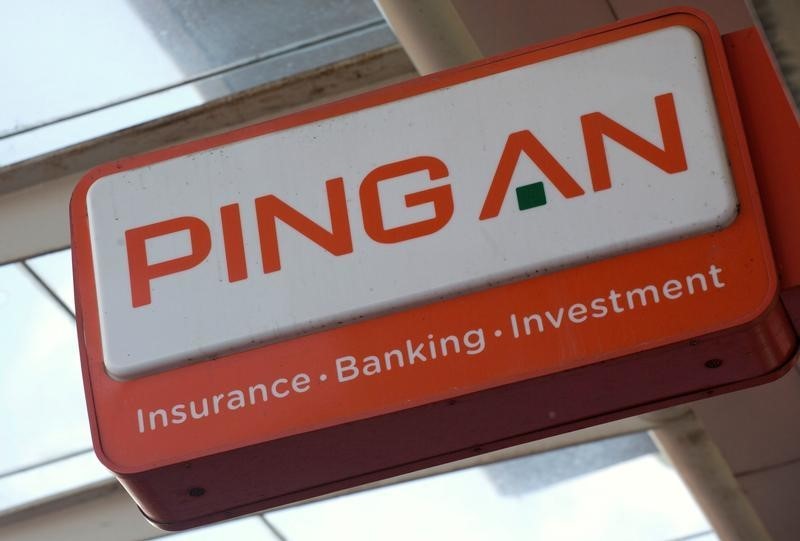By Sumeet Chatterjee
HONG KONG (Reuters) - Years of breakneck growth for China's top insurers has been partly fueled by a splurge on risky investment products that could punch multi-billion-dollar holes in their balance sheets if the slowing economy triggers heavy debt defaults.
Industry premiums have increased by an average 13.4 percent a year since 2010, according to the China Insurance Regulatory Commission (CIRC), but in an environment of low interest rates and unreliable stock markets, insurers have increasingly looked to alternative investments to make the returns they need to service their growing business.
A Reuters survey of the accounts of the top five listed insurers including Ping An Insurance Group Co <601318.SS> and New China Life Insurance <601336.SS> showed their holding of assets other than shares, bonds and cash had more than quadrupled in five years to 984 billion yuan ($150 billion).
These alternative investments - which include opaque, risky shadow banking-linked assets such as trust schemes and wealth management products (WMP) - account for roughly 16 percent of the top five's total assets, up from 5 percent in 2011, the second-largest asset class after fixed-income products, the survey showed.
Analysts say the bulk of these investments including WMPs and the negotiable certificates of deposit, created by banks, are channeled to debt-laden state-owned and private firms at rising risk of default.
The insurers' investments in these assets comes at a time when banks' non-performing loans are already at an 11-year-high of nearly 2 percent, according to official figures, and many analysts believe the situation is much worse, as some banks are slow to recognize problem loans or park them off balance sheet.
Assets such as project asset-backed plans, trust schemes and WMPs are also difficult to turn into cash in a downturn since they lack a secondary market and have long investment horizons.
"The growing investment in risky, higher-return assets is the Titanic, and when it goes down it will take more than one lifeboat," said Thomas Monaco, portfolio manager for Chinese equity at Hong Kong-based Nighthawk Capital.
"The real problem for insurance companies is that the overall investment yields are coming down in China, so they are going out of the credit risk curve. They are going for higher interest rate bets, and a lot of them could go bad."
The top five Chinese insurers did not respond to requests for comment.
AGGRESSIVE STRATEGIES
Top insurers in China, including state-owned China Life and People's Insurance Group of China Co Ltd (HK:1339), get more than half of their premium income from life insurance products.
To generate premium growth, some have been pushing short-term policies with high returns.
"To be able to offer such high-return products to customers, they have to adopt a more aggressive investment strategy to earn a high yield," said Sally Yim, senior vice-president for Asia financial institutions at Moody's Investors Service.
Stocks and bonds are not meeting insurers' requirements; the Shanghai market <.SSEC> is down 19.4 percent this year, Asia's worst-performing market, while yields on 10-year government bonds (CN10YT=RR) fell 98.2 basis points in 2014 and 78.6 basis points in 2015.
Edmond Law, insurance sector analyst at UOB Kay Hian (Hong Kong), said while investments in government bonds would return about 3 percent, some WMPs offered 4-5 percent, along with "very high risk".
New China Life Insurance posted a more than fivefold jump in investment in products such as unlisted equity investments, trust products and WMPs last year compared with 2014.
In contrast, its investment in term deposits fell 23.7 percent, and stocks dropped nearly 2 percent, according to its latest annual report. It posted a 34.3 percent rise in 2015 profit, mainly thanks to income on investments.
New China Life said in the report, however, that since early 2015 it had "drastically tightened its risk appetite for non-standard assets" and regularly assessed and stress-tested their exposure.
The company did not respond to Reuters request for comment on its risk control measures.
To be sure, not all non-traditional alternate investments are risky; the insurers that Reuters surveyed don't provide a breakdown of "alternate investments" category, and earn steady returns on commercial property and infrastructure projects.
But the industry regulator is also taking action to ensure they take adequate care of their $2 trillion in assets - a sum equivalent to about a fifth of China's GDP.
CIRC has launched an inspection of insurers' risk controls over stock, private equity and real estate investments, the official Shanghai Securities News reported earlier this month.
